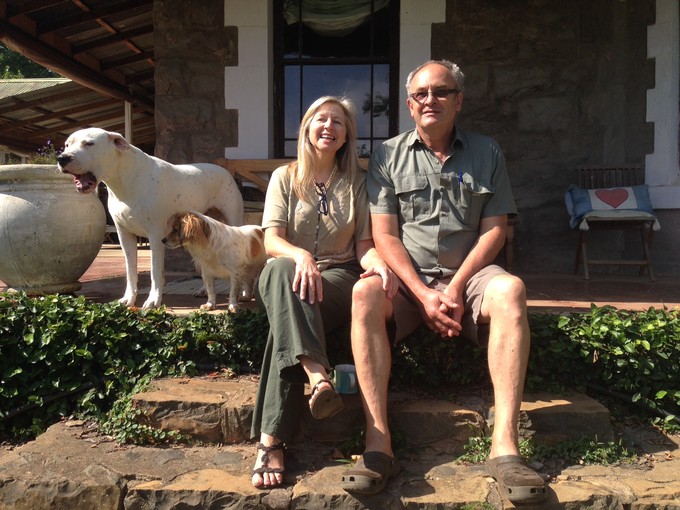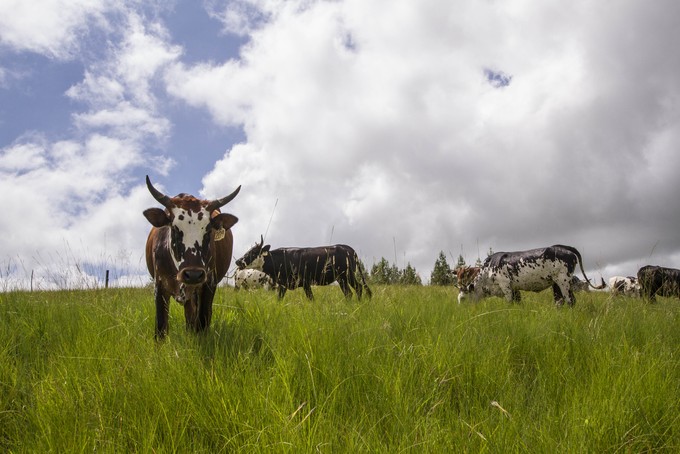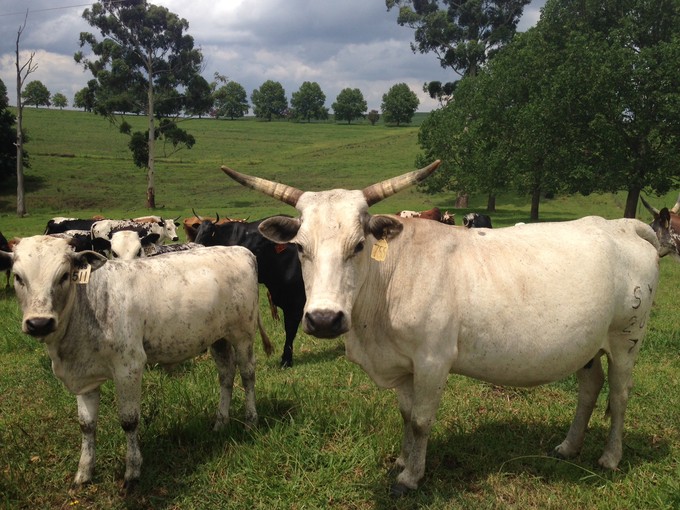How drought is destroying KZN’s cattle farms
Lack of rain has forced farmers to make difficult decisions
Cattle rancher Robin Fowler, 60, believes that farmers are eternal optimists. Last November, when summer rains failed to arrive in the KwaZulu-Natal Midlands, he sold off 160 Nguni cattle, or 80% of his stock. Drought — South Africa’s most severe since rainfall records began in 1904 — had parched the hills, leaving sparse fodder for grazing. Fowler, recognizing that he had no alternative, made plans to thin his herd.
It took him three weeks to decide which animals to keep. An adult Nguni must consume ten percent of its bodyweight in dry matter every day, equal to some 50kg of fresh grass. Based on his available pasture, Fowler figured he could maintain 20 cows, 20 calves and one bull. “Choosing the bull was easy,” said Fowler. “I’d just bought a new one; he was the youngest of my five. The cows were a hell of a lot more difficult.”
Fowler consulted his production records to identify his fittest breeders, noting cows that calved early each season and gave birth every 400 days or less — both signs of good fertility. 30 cows met the criteria. It was ten too many. Fowler shut his office and walked out into the fields to make his final selection.
“Doing it the other way around would have been a waste of time,” explained Fowler, a tall, affable man who has been farming for 37 years. “You get attached to different animals in different ways. Each year one or two calves are born prematurely and we bottle-feed them. You develop a soft spot for those cows, give them names, and so on. I wouldn’t have been able to get rid of them without checking their breeding history first.”
Fowler sold all seven of the hand-reared cows in his herd. (An eighth, Jane, the first Nguni calf born on the farm, died earlier in 2015, fifteen years after learning to walk in Fowler’s kitchen.) The sale took place in three phases: a general stock auction, a special Nguni auction, and a mixed auction with a Brahmin herd.
“I didn’t involve my wife in the process. She would have said, ‘No, keep Blossom, keep Nonhlanhla’ — but I needed to keep my best animals, nothing else,” Fowler said. “It’s difficult not to get emotionally invested. But once you’ve made a scientific calculation that’s what you must stick by.”

Fowler was among the first cattle farmers to sell in the Midlands last year. The week after the third auction he attended, local prices fell by “around 20%,” he said. Declared a provincial disaster area the previous month (October 2015), KZN was in the midst of its worst drought since 1982, a record that has subsequently been eclipsed. As the crisis grew, farmers rushed to dispose of their cattle, driving down the market. “I got in early, so I still got a fair deal,” Fowler said. “When the rains fail you can irrigate your fields or buy in extra feed, but that’s too expensive for most people. Selling, even at low prices, is better than watching your herd die.”
Hendrik Botha, president of the KZN Red Meat Producers Association, said that there had been “substantial” livestock sales across the province as a consequence of poor rainfall, but was unable to give an estimate. “Most commercial farmers got rid of their surplus animals only. A small percentage sold more than that. But it’s been disastrous in some areas. In Zululand, for example, they lost 60-70% of their cattle, and there are few farmers left.”
Besides driving down prices for farmers, the spike in sales would cause beef shortages, Botha said. “People sold more cattle than they would have, and earlier in the season. Consumer prices are already rising as a result. But this will come too late for many producers, who were already struggling to make a profit before the drought. We’re concerned about the future. Nobody is sure how long this cycle will last.”
Fowler’s farm, Corrie Lynn, is situated in the Dargle Valley, 40km inland from Pietermaritzburg. In January 2016 the land appeared lush and green, the sort of naive outsider’s observation Fowler usually finds irritating. Most years, the kikuyu grass reaches knee height by mid-December, and Fowler cuts footpaths through the fields. “I haven’t hitched the mower to my tractor once this season,” he said. “You can almost hear the grass growing when it rains properly. It might look green now, but it’s much too short.”
Fowler grew up on the land, which his grandfather purchased in 1948. He is the third, and probably final, member of his family to run it as a commercial farm. His wife, Tinks, established a wedding venue on the property in 2013; the money this brings in has become indispensable to their financial security. “The rustic farm look is very popular these days,” Tinks said. “Every year there are more weddings in the Dargle area. Some people have built entire new barns to rent out as wedding venues, decorating them to make them look old. Of course, seeing as this was already an authentic working farm, we didn’t need to do anything like that.”

Weddings are not the only leisure activity taking off in the Midlands. The Midlands Meander, a local food, crafts and accommodation route, draws thousands of visitors each year. Demand for property has also grown. “A lot of people want to buy holiday homes or start small projects — organic vegetables, micro-breweries, that kind of thing, ” said Fowler. “Already, many smallholdings in this area aren’t productive farms anymore.”
But as the aesthetic of a farming lifestyle has gained currency, actual farming has become more difficult, with economies of scale driving the evolution of large consolidated enterprises — such as Fowler Farms, a sprawling agri-business owned by Robin Fowler’s cousin, David. “The profit margins have become so tight that it’s hard to stay afloat unless you keep growing, like my cousin has,” said Robin Fowler. “Between the spread of recreational smallholdings and mega-farms, the old mid-sized family farm, like my father and grandfather ran, is being squeezed out.”
At the farm gate Tinks Fowler stopped her car and looked at the cattle grazing near the fence. “It’s so sad,” she said. “We used to have a proper herd. They look so small standing there now. I know it was right to sell, and that we didn’t have a choice, but I still can’t bear looking at them.”
She was on her way into Howick, the nearest town, to buy flowers for a wedding. Her husband remained at home, overseeing renovations on the farmhouse he grew up in. There are two on the property; he now lives in the older building. He is turning the other house into accommodation for wedding guests. That evening, in his kitchen, he pulled out a rainfall chart. “It’s too late for rain now,” he said. “The grass stops growing in February. In the best-case scenario, it will rain again in spring. The grass will grow like crazy, and I’ll be able to buy some more cattle. I’ll spend much more money than I sold mine for, but that doesn’t matter.”
He was quiet until somebody asked what would happen if it didn’t rain, if the 2016 season was dry again.
“Then we’ll really be in the dwang. We’ll have to have more weddings.”

Disclosure: The author is a friend of the Fowler family.
Support independent journalism
Donate using Payfast

Don't miss out on the latest news
We respect your privacy, and promise we won't spam you.
© 2016 GroundUp. 
This article is licensed under a Creative Commons Attribution-NoDerivatives 4.0 International License.

